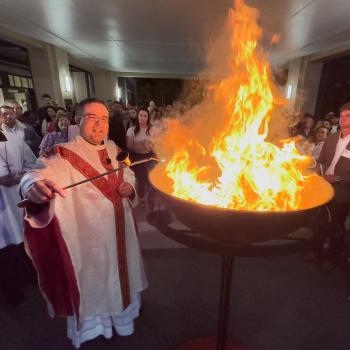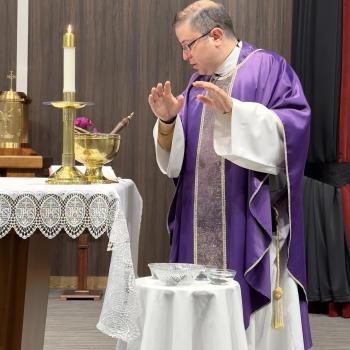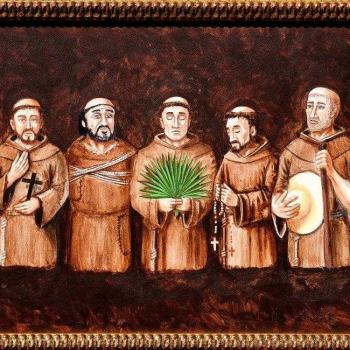[part of a homily series at my parish on the new translation of the Roman Missal]
Last week Father Fred gave an overview of why we will soon have a new translation of the Mass. Change can be uncomfortable; especially if you grow used to doing things a particular way for forty years as we have as Catholics praying with these prayers during Mass. But change can provide an opportunity to look at things we have been doing for a long time with certain freshness and a sense of renewal. This is an opportunity to look at what we do Sunday after Sunday, especially to look at the parts of the Mass and see how they fit together. It’s an opportunity to better grasp why we do what we do as Catholics when we come to Mass.
Last week Father Fred gave an overview of why we will soon have a new translation of the Mass. Change can be uncomfortable; especially if you grow used to doing things a particular way for forty years as we have as Catholics praying with these prayers during Mass. But change can provide an opportunity to look at things we have been doing for a long time with certain freshness and a sense of renewal. This is an opportunity to look at what we do Sunday after Sunday, especially to look at the parts of the Mass and see how they fit together. It’s an opportunity to better grasp why we do what we do as Catholics when we come to Mass.
At every Mass, after the greeting, the priest says these or similar words:
“Brothers and sisters let us acknowledge our sins, and so prepare ourselves to celebrate the sacred mysteries.”
This part of the Mass begins the Penitential Act. To prepare ourselves to hear God’s Word in Scripture and to receive Jesus’ Body and Blood, we begin by taking a moment to acknowledge our sins and to ask for forgiveness. This isn’t confession, but it is a moment to ask for and receive God’s mercy.
So many times our minds remain blank during this brief pause. We should take advantage of this opportunity to experience God’s mercy, recall your sins and ask for forgiveness.
The priest then has three options on how to proceed. You may wonder why sometimes we pray the “I confess” at this point while other times we don’t, well, it’s is up to the priest to decide what to do.
The first option is the Confiteor, a prayer that takes its name from its first word “I confess.” This is an ancient prayer of the liturgy, its earliest form used in the 8th century. It’s an acknowledgement of sin and a request for mercy.
We explicitly ask for prayers from the Virgin Mary, angels, saints and our brothers and sisters. Have you ever been struck by the fact that while we ask for prayers, we are also being asked to pray for others? Do we pray for our brothers and sisters around us who have asked for prayer? Do we pray for them during the Mass or later at home during the week?
The words of the Confiteor have changed just a little bit in the new translation, but most notably is the restoration of the phrase “through my fault, through my fault, through my most grievous fault” (mea culpa, mea culpa, mea maxima culpa), with the strikes at the breast. Growing up in Peru, I always loved these three strikes at the beginning of Mass. In Spanish, as well as every other language I’m familiar with except English, this phrase was kept when Mass was translated in the 70s. English has now restored it. Now let’s pray it together:
I confess to almighty God and to you, my brothers and sisters, that I have greatly sinned, in my thoughts and in my words, in what I have done and in what I have failed to do, through my fault, through my fault, through my most grievous fault; therefore I ask blessed Mary ever-Virgin, all the Angels and Saints, and you, my brothers and sisters, to pray for me to the Lord our God.
May almighty God have mercy on us, forgive us our sins, and bring us to everlasting life.
Note that at this moment we receive forgiveness, God prepares us to enter into the Mass cleansed so we may be more attentive to His Word and more receptive of his presence in the Eucharist.
Some say it’s too harsh to say “through my fault, through my fault, through my most grievous fault”, but as I heard a wise priest say on this topic, “it is better to exaggerate than to water down our repentance.” The phrase is there to help us acknowledge our sin.
The second option of the Penitential Act is rarely used; you see it in the pamphlet. Now that we have the pamphlet, we may use it occasionally so we can learn it. Let’s practice:
P: Have mercy on us, O Lord.
PPL: For we have sinned against you.
P: Show us, O Lord, your mercy.
PPL: And grant us your salvation.
The third option is the most common. It involves three invocations:
You were sent to heal the contrite of heart: Lord, have mercy.
You came to call sinners: Christ, have mercy.
You are seated at the right hand of the Father to intercede for us: Lord, have mercy.
After seeking forgiveness and receiving it in the Penitential Act, we immediately sing the Gloria.
The Gloria is an ancient Greek hymn, its first traces found in the 2nd century. It was later translated into Latin and inserted into the Mass. This hymn of praise begins with the praises sung by the angels that announced the birth of Jesus to the shepherds in Bethlehem, “Glory to God in the highest, and on earth peace to people of good will.” The hymn continues with acclamations of praise and supplications for mercy and ends by praising the Trinity.
The Gloria ought to be sung. It’s a joyful song of praise sung on Sundays and Solemnities to celebrate the Lord’s Day, the day of the resurrection. We don’t sing it during Advent and Lent because these are seasons of penance and waiting, therefore we don’t sing this joyful hymn.
The new English translation follows the Latin hymn-like structure with the repetition of literary structures and words which were lost in the present translation. Follow along in the pamphlet:
“We praise you, we bless you, we adore you, we glorify you, we give you thanks for your great glory, Lord God, heavenly King, O God, almighty Father.”
You can almost imagine the choirs of angels praising and acclaiming God with these words. At Mass we join in their praises as we gather to praise God as a community of faith.
Father Fred, Deacon Jim and I hope that as we go through the parts of the Mass these next few weeks, our appreciation and reverence for the Eucharist may be deepened and strengthened.
















